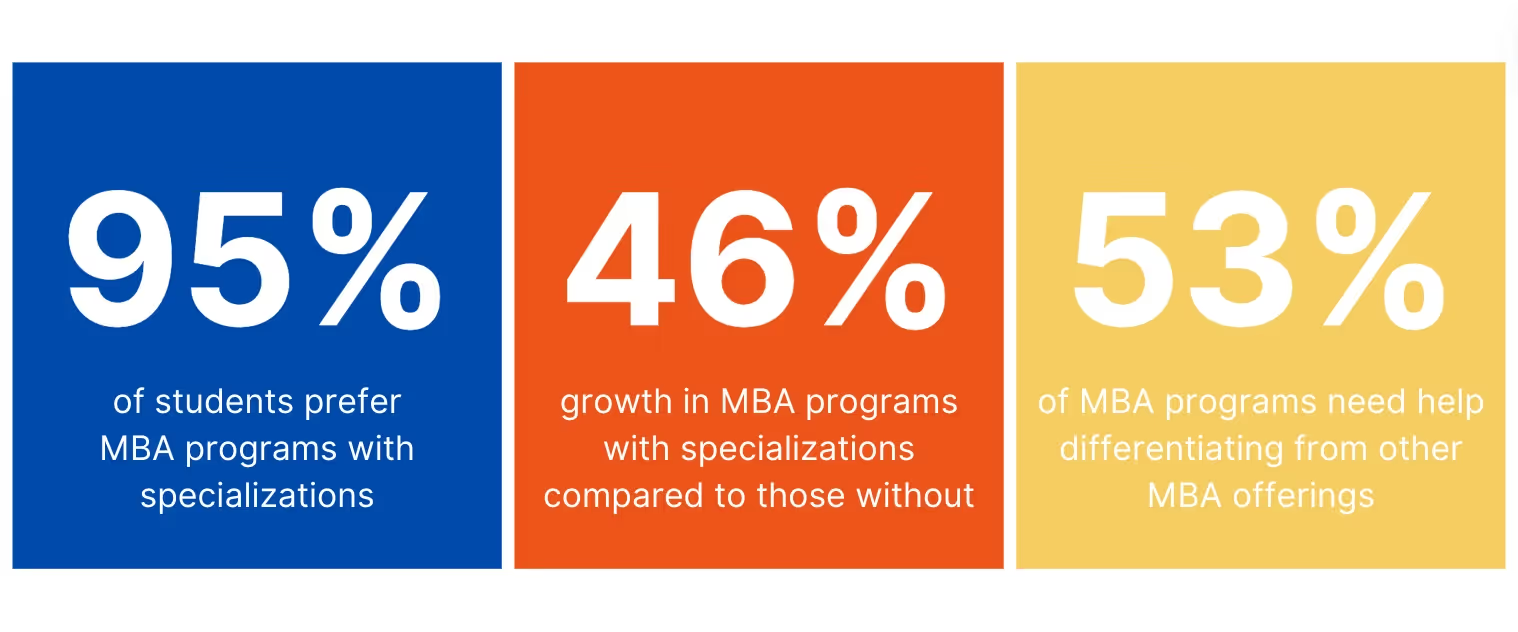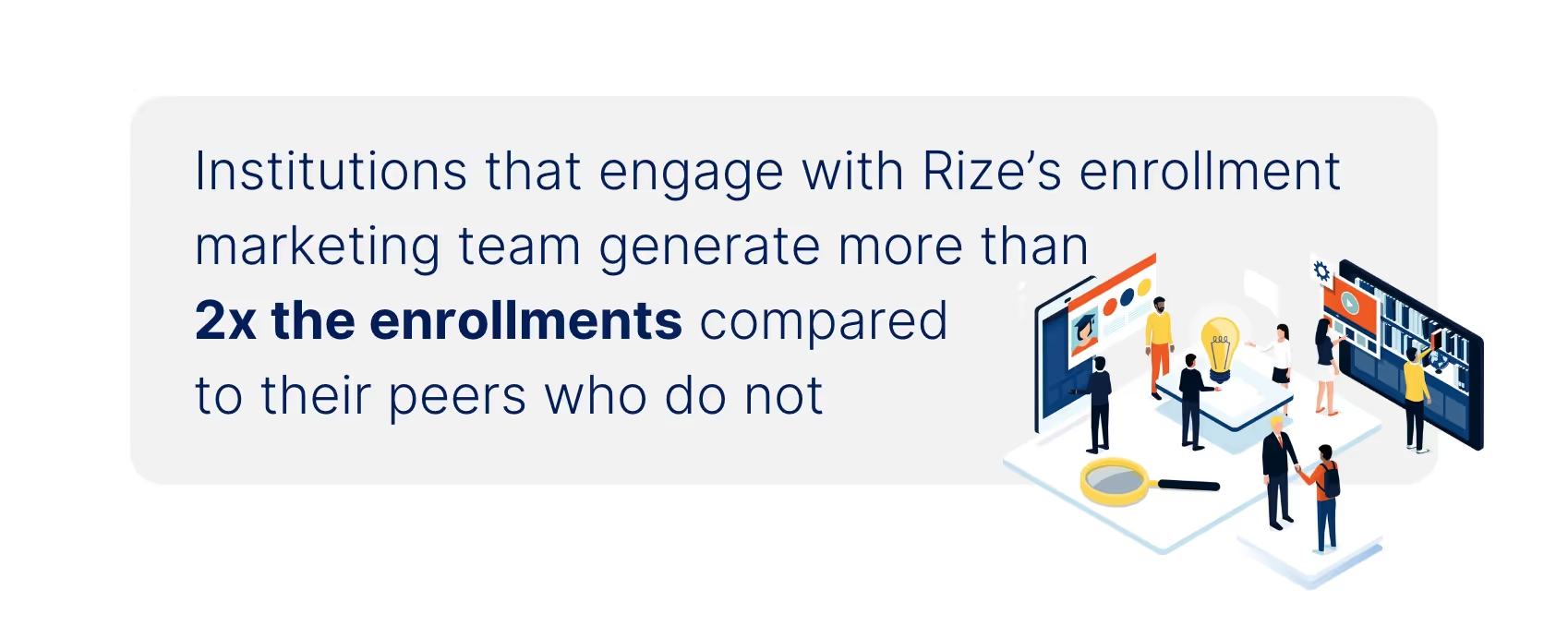The State of MBA Programs: Unlocking More Value with Specializations
Unlock more value with MBA program specializations. Learn about the new Rize MBA bundle with concentrations in AI, Business Analytics, Cybersecurity, Finance, and Healthcare Administration.

Contents:
- Unlocking More Value with Specializations
- Artificial Intelligence Specialization
- Business Analytics Specialization
- Cybersecurity Specialization
- Finance Specialization
- Healthcare Administration Specialization
- Enrollment Marketing
- Faculty Governance
- Conclusion
The AACSB reports that MBA programs are facing significant disruptions in today’s market, with 61% struggling with declining enrollment and 53% that require help differentiating their programs from other MBA offerings. To counteract the market demand for MBA programs, 41% of institutions are focusing on improving students’ analytics and in-demand job skills.
Despite these headwinds, the labor market demand for MBA graduates remains strong, making it an important program offering for universities. According to University Business, nearly twice the amount of employers believe recently graduated MBA earners can navigate the post-pandemic landscape better than experienced employees hired directly from the industry.
Unlocking More Value with Specializations
RNL reports that 95% of students prefer MBA programs with specializations. Moreover, AACSB research shows that specialized programs enjoyed a 19% enrollment increase in 2021, while standard MBA programs saw only a 13% rise. In other words, MBA programs with specializations grew enrollment 46% more than non-specialized programs. The Graduate Management Admission Council reports that 1 in 4 employers who plan to hire recent MBA graduates say that specialized MBA graduates tend to receive higher starting salaries compared to traditional MBA graduates.
To further support better outcomes for our partner institutions and their students, Rize is developing 5 MBA specializations in Artificial Intelligence, Business Analytics, Cybersecurity, Finance, and Healthcare Administration. Depending on your existing MBA program requirements, each specialization includes 3 or 4 courses that pair with your MBA course catalog. These have been developed in partnership with faculty from Harvard Business School, Cornell, Dartmouth, and the University of Texas at Austin.
Leveraging 7-week online asynchronous courses, our all-new MBA bundle will provide you—and your students—the flexibility and agility to stay on the cutting edge of new offerings and labor market needs. Harness the power of consortium-based learning that combines best-in-class curriculum with your institution’s unique identity, mission, and support.
In the following report, we highlight some of the most in-demand MBA specializations. You can read it below or download the PDF.

Artificial Intelligence Specialization
This accessible, low-code program empowers future managers to understand how to apply AI strategically to innovate and streamline business processes. At the end of this program, students will be able to articulate business use cases for different AI models (ChatGPT, predictive modeling, etc.) and their limitations, understand the foundation of those tools, methods to leverage AI both creatively and strategically, and how to ethically implement and optimize an AI strategy for a business.
Why AI?
According to PwC’s 2024 Global AI Jobs Barometer, sectors that benefit from AI are experiencing almost 5x higher growth in labor productivity. Postings for AI jobs are growing 3.5x faster than average, meaning that for every AI job posting in 2012, there are now seven job postings per the World Economic Forum. AI skills are becoming more important than job experience. Furthermore, AI ranked in the top five in skills employers most want to see out of graduates across industries according to University Business. But where does it come into play with an MBA degree? At the core of all successful businesses is the need to make informed decisions—which require data. Today, the sheer volume of data exceeds human capacity to comprehend, making AI a necessity to parse it into meaningful insights. It’s the future of all complex decision making. And those who can make the best and most informed guesses will command that future.
Artificial Intelligence Courses Powered by Rize
- Generative AI for Managers: Learn to understand, implement, and leverage generative AI in your organization, addressing ethical considerations and up-skilling your workforce for a competitive edge.
- Business Use Cases for AI: Explore various AI models, their business applications, and basic Python for predictive and prescriptive modeling to identify and implement effective AI strategies in your organization.
- AI Governance and Ethics: Gain insights into AI governance, ethical guidelines, and regulatory compliance to develop and enforce responsible AI policies within your organization.
- Managing AI Projects: Acquire skills in managing the entire lifecycle of AI projects, from planning to deployment, ensuring alignment with business objectives, and effective stakeholder communication.
Artificial Intelligence Program Consultant
Dr. Risto Miikkulainen: Professor of Computer Science at the University of Texas at Austin & VP of AI Research at Cognizant Advanced AI Labs

Business Analytics Specialization
Today’s business environment is all about leveraging data to make decisions. This program prepares students for data-driven business communications, project management, and analyses with the goal of driving ethical and effective actions. They’ll start with a real-world problem, determine what data to collect, manipulate and interpret the data, create visualizations, and ultimately be able to tell a data-informed story to both technical and non-technical audiences that drives business impact.
Why Business Analytics?
Whether it's identifying market trends, optimizing operational processes, or personalizing customer experiences, at its core, business analytics is all about extracting actionable insights from data—and communicating it to others—to help businesses stay ahead. Companies that champion data-driven insights in business are 77% more likely to have significantly exceeded their business goals according to research from Deloitte.
Studying business analytics opens doors to virtually any industry, offering a ton of flexibility and the excitement of applying your skills everywhere from finance and IT to start-ups and hospitals. Business analytics professionals thrive on the diversity of problem- solving opportunities across an organization, from sales and finance to warehouse management.
Business Analytics Courses Powered by Rize
- Storytelling with Data: Students create data visualizations and narratives, effectively communicate complex insights to diverse audiences, and drive business decisions through data storytelling.
- Spreadsheet Modeling for Decision-Making: Students use spreadsheet modeling to analyze complex datasets, create financial forecasts, and effectively communicate insights to support data-driven decision-making in business contexts.
- Python for Business Analytics: Students transition from Excel to Python for business data analysis and workflow optimization. Prepares students with little or no prior programming experience with key foundational analytics operations in Python.
- Managing AI Projects: This course equips students with the skills to manage AI projects comprehensively, emphasizing bias mitigation, ethical considerations, model accuracy, and continuous monitoring to ensure responsible and effective business outcomes.
Business Analytics Program Consultant
Dr. Michael Parzen: Senior Lecturer of Applied Business Analytics at Harvard Business School

Cybersecurity Specialization
Students in this program will be prepared for ‘Oversee and Govern’ and ‘Protect and Defend’ jobs within the government’s NICE Cybersecurity Workforce Framework. As such, students will learn to effectively manage cybersecurity for businesses: they’ll understand the risks associated with different network designs, maintain compliance to laws and regulations governing the space, develop strategies to mitigate risks within companies, and manage crises under pressure to ensure fast and comprehensive recoveries.
Why Cybersecurity?
Big data creates opportunities to better know our consumers and drive profit—and almost every aspect of life today, from our phones to our cars, is connected. But the risk of dangerous threat actors has risen alongside our global interconnectivity. Cybersecurity efforts have been increasing, but data continue to increase year-on-year, with a 20% increase in data breaches from 2022-2023. According to the 2023 ISC2 Cybersecurity Workforce Study, 75% of cybersecurity professionals view the current threat landscape as the most challenging it has been in the past five years—yet only 52% believe that their organization has the tools and people needed to respond to these cyber incidents, which explains why organizations are willing to pay great salaries (up to 7 figures) to attract and retain cybersecurity talent.
Cybersecurity Courses Powered by Rize
- Information Governance, Risk Management, and Compliance: Covers essential skills in corporate governance, risk management, and compliance, covering board responsibilities, risk identification, and audit practices through real-world case studies.
- Network Architectures for Cyber Managers: Offers an understanding of information and operational technology principles, covering network architectures, cloud computing, data management, and the applications and limits of machine learning for predictive maintenance and process optimization.
- Cyber Risk Management and Strategy: Covers essential principles and frameworks, teaching students to identify cyber threats, design policies, and develop incident response plans to manage and mitigate cyber risks.
- Ethical Hacking: Offers hands-on training in ethical hacking techniques, using open-source tools and practical simulations to identify and mitigate security vulnerabilities.
Cybersecurity Program Consultant
Dr. Greogry Falco: Assistant Professor at Cornell University’s Sibley School of Mechanical and Aerospace Engineering and the Systems Engineering Program

Finance Specialization
By the end of this program, students will have comprehensive training in key financial principles and practices essential for strategic management. They will learn to analyze corporate financial statements, conduct present value analysis, build financial models, and evaluate risk and return. The program will also cover bond valuation, portfolio risk measurement, cost of capital, and financial instruments like futures and options. Finally, students will investigate innovations that are currently disrupting traditional finance, like blockchains, cryptocurrencies, and decentralized finance (DeFi).
Why Finance?
Often what firsts draws students to finance is money, and there’s no doubt that those who work in finance are handsomely paid. With entry-level financial analyst salaries already pushing six figures with a national median at $99,000, and financial managerial salaries at $156,000, the potential for earning is high. Down the line, graduates could grow into a CFO role with even greater opportunities.
Salary aside, finance is one of the most clear differentiators that can help any graduate bring value and impact to any industry. With 82% of CFOs holding an MBA, students who specialize in finance during their MBA are strategically positioning themselves to follow this lucrative and well-established career path.
Finance Courses Powered by Rize
- Managerial Finance: Introduction to role of finance in companies and to capital markets. Key areas covered include present value analysis, risk and return, capital budgeting, company capital structure, corporate financial planning and budgeting, and risk analysis.
- Capital Markets and Investing: Covers bond valuation, risk measurement, cost of capital, portfolio theory, CAPM (the Capital Asset Pricing Model), interest rates, and basics of futures and options contracts.
- Financial Statements Analysis and Valuation: Covers financial statement analysis, ratio analysis, risk assessment, pro forma statements, and valuation techniques, equipping students to evaluate and value companies effectively.
- Frontiers of Finance: With a general theme of disruptors in traditional finance, covers blockchain technology, cryptocurrencies, and DeFi (decentralized finance).
Finance Program Consultant
Dr. Robert Hansen: Professor of Business Administration at Dartmouth's Tuck School of Business and Faculty Director of the Center for Business and Society

Healthcare Administration Specialization
Students in this program will be prepared to ethically and effectively manage within diverse and growing healthcare systems: clinics, hospitals, the public sector, insurance, and consulting, to name a few. They will comprehensively understand the structure and economics of the US healthcare system, develop spreadsheet modeling and cost accounting skills, understand key challenges for management of healthcare and make data-driven decisions for healthcare organizations.
Why Healthcare Administration?
Working in healthcare administration is so much more than simply managing doctors; it’s work that can be entrepreneurial, innovative, and lucrative, taking place in start-ups and banks just as much as it is in hospitals and fast-growing public programs like Medicare. Employment for healthcare administrators is projected to grow by 28% between 2022 and 2032. With the median annual wages of medical and health services managers at $110,680 as of May 2023, and the top 10 percent earning more than $216,750, the financial rewards in this field are substantial and the job options rich and diverse. And total compensation for top late-career for-profit health system executives can be truly astronomical, with total compensation pushing into the eight figures.
Healthcare Administration Powered by Rize
- Structure and Economics of the US Healthcare System: Students gain a comprehensive understanding of the US healthcare system's structure and economics, covering topics such as principles of health economics and insurance markets, hospital and physician payment models, analysis of health policy changes, and more.
- Management of Healthcare Organizations: Students explore healthcare management principles and practices, emphasizing strategic analysis, workforce and IT management, revenue optimization, dealing with ethical issues, leadership, and more.
- Data Analysis for Healthcare Management: Students learn to manage and communicate healthcare data, focusing on dashboards, patient-level data presentation, EHR systems, data analytics, data visualization tools, and ethical considerations.
- Healthcare Finance: Students learn to use financial data for quantitative decision-making in healthcare organizations, covering cost accounting, financial statement analysis, capital budgeting, pricing and cost analysis, discounted cash flow analysis, and presenting financial recommendations.
Healthcare Administration Program Consultant
Dr. Robert Hansen: Professor of Business Administration at Dartmouth's Tuck School of Business and Faculty Director of the Center for Business and Society

Enrollment Marketing
Rize’s Enrollment Marketing team will collaborate with your institution’s MBA, enrollment, and marketing teams to craft a comprehensive enrollment marketing strategy that includes not only the MBA specializations, but also your overall MBA program.
Sample Enrollment Assets
- Messaging Guides
- Flyers
- Email Campaigns
- Social Media Posts
- Program Postcards
- Web Optimized Content
Sample Strategy Consultation Topics
- Web page SEO strategy
- Digital media strategy (Paid search, Paid social)
- Agency collaboration strategies, if applicable
- Lead through Enrollment Funnel Best Practices (Speed to Lead, Conversion, etc).
- Lead generation tools
- Continued market research with Gray DI

Faculty Governance
We provide you with complete program documentation with ample time to prepare for governance. This includes detailed syllabi, course outlines, and learning outcomes, ensuring all necessary materials are prepared for a seamless launch.
Approval Process Support
As part of our collaboration, we’ll also partner with your MBA program director to navigate the faculty governance and approval process. This includes drafting proposals, conducting market research, etc. This not only ensures ample time for thorough review and support from your governance bodies, facilitating a smoother implementation, but also well in advance to ensure marketing approval is received as quickly as possible.
Academic Calendar Alignment
Rize aims to align its graduate level academic calendar with our partners, to the extent possible, and is aiming to finalize the schedule by December 2024. Being an early-adopter ensures that all necessary adjustments and integrations are made in time for the Spring semester.
Conclusion
If you’re looking for ways to grow your enrollment by differentiating your MBA programs with the most in-demand specializations, schedule time to talk to our Partnerships team to see if our programs are right for your institution.

The State of MBA Programs: Unlocking More Value with Specializations
Unlock more value with MBA program specializations. Learn about the new Rize MBA bundle with concentrations in AI, Business Analytics, Cybersecurity, Finance, and Healthcare Administration.
Contents:
- Unlocking More Value with Specializations
- Artificial Intelligence Specialization
- Business Analytics Specialization
- Cybersecurity Specialization
- Finance Specialization
- Healthcare Administration Specialization
- Enrollment Marketing
- Faculty Governance
- Conclusion
The AACSB reports that MBA programs are facing significant disruptions in today’s market, with 61% struggling with declining enrollment and 53% that require help differentiating their programs from other MBA offerings. To counteract the market demand for MBA programs, 41% of institutions are focusing on improving students’ analytics and in-demand job skills.
Despite these headwinds, the labor market demand for MBA graduates remains strong, making it an important program offering for universities. According to University Business, nearly twice the amount of employers believe recently graduated MBA earners can navigate the post-pandemic landscape better than experienced employees hired directly from the industry.
Unlocking More Value with Specializations
RNL reports that 95% of students prefer MBA programs with specializations. Moreover, AACSB research shows that specialized programs enjoyed a 19% enrollment increase in 2021, while standard MBA programs saw only a 13% rise. In other words, MBA programs with specializations grew enrollment 46% more than non-specialized programs. The Graduate Management Admission Council reports that 1 in 4 employers who plan to hire recent MBA graduates say that specialized MBA graduates tend to receive higher starting salaries compared to traditional MBA graduates.
To further support better outcomes for our partner institutions and their students, Rize is developing 5 MBA specializations in Artificial Intelligence, Business Analytics, Cybersecurity, Finance, and Healthcare Administration. Depending on your existing MBA program requirements, each specialization includes 3 or 4 courses that pair with your MBA course catalog. These have been developed in partnership with faculty from Harvard Business School, Cornell, Dartmouth, and the University of Texas at Austin.
Leveraging 7-week online asynchronous courses, our all-new MBA bundle will provide you—and your students—the flexibility and agility to stay on the cutting edge of new offerings and labor market needs. Harness the power of consortium-based learning that combines best-in-class curriculum with your institution’s unique identity, mission, and support.
In the following report, we highlight some of the most in-demand MBA specializations. You can read it below or download the PDF.

Artificial Intelligence Specialization
This accessible, low-code program empowers future managers to understand how to apply AI strategically to innovate and streamline business processes. At the end of this program, students will be able to articulate business use cases for different AI models (ChatGPT, predictive modeling, etc.) and their limitations, understand the foundation of those tools, methods to leverage AI both creatively and strategically, and how to ethically implement and optimize an AI strategy for a business.
Why AI?
According to PwC’s 2024 Global AI Jobs Barometer, sectors that benefit from AI are experiencing almost 5x higher growth in labor productivity. Postings for AI jobs are growing 3.5x faster than average, meaning that for every AI job posting in 2012, there are now seven job postings per the World Economic Forum. AI skills are becoming more important than job experience. Furthermore, AI ranked in the top five in skills employers most want to see out of graduates across industries according to University Business. But where does it come into play with an MBA degree? At the core of all successful businesses is the need to make informed decisions—which require data. Today, the sheer volume of data exceeds human capacity to comprehend, making AI a necessity to parse it into meaningful insights. It’s the future of all complex decision making. And those who can make the best and most informed guesses will command that future.
Artificial Intelligence Courses Powered by Rize
- Generative AI for Managers: Learn to understand, implement, and leverage generative AI in your organization, addressing ethical considerations and up-skilling your workforce for a competitive edge.
- Business Use Cases for AI: Explore various AI models, their business applications, and basic Python for predictive and prescriptive modeling to identify and implement effective AI strategies in your organization.
- AI Governance and Ethics: Gain insights into AI governance, ethical guidelines, and regulatory compliance to develop and enforce responsible AI policies within your organization.
- Managing AI Projects: Acquire skills in managing the entire lifecycle of AI projects, from planning to deployment, ensuring alignment with business objectives, and effective stakeholder communication.
Artificial Intelligence Program Consultant
Dr. Risto Miikkulainen: Professor of Computer Science at the University of Texas at Austin & VP of AI Research at Cognizant Advanced AI Labs

Business Analytics Specialization
Today’s business environment is all about leveraging data to make decisions. This program prepares students for data-driven business communications, project management, and analyses with the goal of driving ethical and effective actions. They’ll start with a real-world problem, determine what data to collect, manipulate and interpret the data, create visualizations, and ultimately be able to tell a data-informed story to both technical and non-technical audiences that drives business impact.
Why Business Analytics?
Whether it's identifying market trends, optimizing operational processes, or personalizing customer experiences, at its core, business analytics is all about extracting actionable insights from data—and communicating it to others—to help businesses stay ahead. Companies that champion data-driven insights in business are 77% more likely to have significantly exceeded their business goals according to research from Deloitte.
Studying business analytics opens doors to virtually any industry, offering a ton of flexibility and the excitement of applying your skills everywhere from finance and IT to start-ups and hospitals. Business analytics professionals thrive on the diversity of problem- solving opportunities across an organization, from sales and finance to warehouse management.
Business Analytics Courses Powered by Rize
- Storytelling with Data: Students create data visualizations and narratives, effectively communicate complex insights to diverse audiences, and drive business decisions through data storytelling.
- Spreadsheet Modeling for Decision-Making: Students use spreadsheet modeling to analyze complex datasets, create financial forecasts, and effectively communicate insights to support data-driven decision-making in business contexts.
- Python for Business Analytics: Students transition from Excel to Python for business data analysis and workflow optimization. Prepares students with little or no prior programming experience with key foundational analytics operations in Python.
- Managing AI Projects: This course equips students with the skills to manage AI projects comprehensively, emphasizing bias mitigation, ethical considerations, model accuracy, and continuous monitoring to ensure responsible and effective business outcomes.
Business Analytics Program Consultant
Dr. Michael Parzen: Senior Lecturer of Applied Business Analytics at Harvard Business School

Cybersecurity Specialization
Students in this program will be prepared for ‘Oversee and Govern’ and ‘Protect and Defend’ jobs within the government’s NICE Cybersecurity Workforce Framework. As such, students will learn to effectively manage cybersecurity for businesses: they’ll understand the risks associated with different network designs, maintain compliance to laws and regulations governing the space, develop strategies to mitigate risks within companies, and manage crises under pressure to ensure fast and comprehensive recoveries.
Why Cybersecurity?
Big data creates opportunities to better know our consumers and drive profit—and almost every aspect of life today, from our phones to our cars, is connected. But the risk of dangerous threat actors has risen alongside our global interconnectivity. Cybersecurity efforts have been increasing, but data continue to increase year-on-year, with a 20% increase in data breaches from 2022-2023. According to the 2023 ISC2 Cybersecurity Workforce Study, 75% of cybersecurity professionals view the current threat landscape as the most challenging it has been in the past five years—yet only 52% believe that their organization has the tools and people needed to respond to these cyber incidents, which explains why organizations are willing to pay great salaries (up to 7 figures) to attract and retain cybersecurity talent.
Cybersecurity Courses Powered by Rize
- Information Governance, Risk Management, and Compliance: Covers essential skills in corporate governance, risk management, and compliance, covering board responsibilities, risk identification, and audit practices through real-world case studies.
- Network Architectures for Cyber Managers: Offers an understanding of information and operational technology principles, covering network architectures, cloud computing, data management, and the applications and limits of machine learning for predictive maintenance and process optimization.
- Cyber Risk Management and Strategy: Covers essential principles and frameworks, teaching students to identify cyber threats, design policies, and develop incident response plans to manage and mitigate cyber risks.
- Ethical Hacking: Offers hands-on training in ethical hacking techniques, using open-source tools and practical simulations to identify and mitigate security vulnerabilities.
Cybersecurity Program Consultant
Dr. Greogry Falco: Assistant Professor at Cornell University’s Sibley School of Mechanical and Aerospace Engineering and the Systems Engineering Program

Finance Specialization
By the end of this program, students will have comprehensive training in key financial principles and practices essential for strategic management. They will learn to analyze corporate financial statements, conduct present value analysis, build financial models, and evaluate risk and return. The program will also cover bond valuation, portfolio risk measurement, cost of capital, and financial instruments like futures and options. Finally, students will investigate innovations that are currently disrupting traditional finance, like blockchains, cryptocurrencies, and decentralized finance (DeFi).
Why Finance?
Often what firsts draws students to finance is money, and there’s no doubt that those who work in finance are handsomely paid. With entry-level financial analyst salaries already pushing six figures with a national median at $99,000, and financial managerial salaries at $156,000, the potential for earning is high. Down the line, graduates could grow into a CFO role with even greater opportunities.
Salary aside, finance is one of the most clear differentiators that can help any graduate bring value and impact to any industry. With 82% of CFOs holding an MBA, students who specialize in finance during their MBA are strategically positioning themselves to follow this lucrative and well-established career path.
Finance Courses Powered by Rize
- Managerial Finance: Introduction to role of finance in companies and to capital markets. Key areas covered include present value analysis, risk and return, capital budgeting, company capital structure, corporate financial planning and budgeting, and risk analysis.
- Capital Markets and Investing: Covers bond valuation, risk measurement, cost of capital, portfolio theory, CAPM (the Capital Asset Pricing Model), interest rates, and basics of futures and options contracts.
- Financial Statements Analysis and Valuation: Covers financial statement analysis, ratio analysis, risk assessment, pro forma statements, and valuation techniques, equipping students to evaluate and value companies effectively.
- Frontiers of Finance: With a general theme of disruptors in traditional finance, covers blockchain technology, cryptocurrencies, and DeFi (decentralized finance).
Finance Program Consultant
Dr. Robert Hansen: Professor of Business Administration at Dartmouth's Tuck School of Business and Faculty Director of the Center for Business and Society

Healthcare Administration Specialization
Students in this program will be prepared to ethically and effectively manage within diverse and growing healthcare systems: clinics, hospitals, the public sector, insurance, and consulting, to name a few. They will comprehensively understand the structure and economics of the US healthcare system, develop spreadsheet modeling and cost accounting skills, understand key challenges for management of healthcare and make data-driven decisions for healthcare organizations.
Why Healthcare Administration?
Working in healthcare administration is so much more than simply managing doctors; it’s work that can be entrepreneurial, innovative, and lucrative, taking place in start-ups and banks just as much as it is in hospitals and fast-growing public programs like Medicare. Employment for healthcare administrators is projected to grow by 28% between 2022 and 2032. With the median annual wages of medical and health services managers at $110,680 as of May 2023, and the top 10 percent earning more than $216,750, the financial rewards in this field are substantial and the job options rich and diverse. And total compensation for top late-career for-profit health system executives can be truly astronomical, with total compensation pushing into the eight figures.
Healthcare Administration Powered by Rize
- Structure and Economics of the US Healthcare System: Students gain a comprehensive understanding of the US healthcare system's structure and economics, covering topics such as principles of health economics and insurance markets, hospital and physician payment models, analysis of health policy changes, and more.
- Management of Healthcare Organizations: Students explore healthcare management principles and practices, emphasizing strategic analysis, workforce and IT management, revenue optimization, dealing with ethical issues, leadership, and more.
- Data Analysis for Healthcare Management: Students learn to manage and communicate healthcare data, focusing on dashboards, patient-level data presentation, EHR systems, data analytics, data visualization tools, and ethical considerations.
- Healthcare Finance: Students learn to use financial data for quantitative decision-making in healthcare organizations, covering cost accounting, financial statement analysis, capital budgeting, pricing and cost analysis, discounted cash flow analysis, and presenting financial recommendations.
Healthcare Administration Program Consultant
Dr. Robert Hansen: Professor of Business Administration at Dartmouth's Tuck School of Business and Faculty Director of the Center for Business and Society

Enrollment Marketing
Rize’s Enrollment Marketing team will collaborate with your institution’s MBA, enrollment, and marketing teams to craft a comprehensive enrollment marketing strategy that includes not only the MBA specializations, but also your overall MBA program.
Sample Enrollment Assets
- Messaging Guides
- Flyers
- Email Campaigns
- Social Media Posts
- Program Postcards
- Web Optimized Content
Sample Strategy Consultation Topics
- Web page SEO strategy
- Digital media strategy (Paid search, Paid social)
- Agency collaboration strategies, if applicable
- Lead through Enrollment Funnel Best Practices (Speed to Lead, Conversion, etc).
- Lead generation tools
- Continued market research with Gray DI

Faculty Governance
We provide you with complete program documentation with ample time to prepare for governance. This includes detailed syllabi, course outlines, and learning outcomes, ensuring all necessary materials are prepared for a seamless launch.
Approval Process Support
As part of our collaboration, we’ll also partner with your MBA program director to navigate the faculty governance and approval process. This includes drafting proposals, conducting market research, etc. This not only ensures ample time for thorough review and support from your governance bodies, facilitating a smoother implementation, but also well in advance to ensure marketing approval is received as quickly as possible.
Academic Calendar Alignment
Rize aims to align its graduate level academic calendar with our partners, to the extent possible, and is aiming to finalize the schedule by December 2024. Being an early-adopter ensures that all necessary adjustments and integrations are made in time for the Spring semester.
Conclusion
If you’re looking for ways to grow your enrollment by differentiating your MBA programs with the most in-demand specializations, schedule time to talk to our Partnerships team to see if our programs are right for your institution.

